Four years ago Dalia Khalifa became the face of the Israeli attack on Gaza when Mohammed Asad took a photograph of the 9-year-old’s heavily-wounded face and the image was shared around the world. I went to her home last week to see how she is doing.
“There are three wounds still, that did not disappear despite the four years passed,” Dalia said. She was wounded by shrapnel from an Israeli artillery shell on August 1, 2014 during the seven-week war on Gaza.
Dalia, 13, greeted me downstairs with a red headband on her semi-wet hair and wearing the Eid al-Fitr (Islamic festival) suit, which ended in mid-June. And she insisted on using her mother’s lipstick, found on her mother’s dressing table.
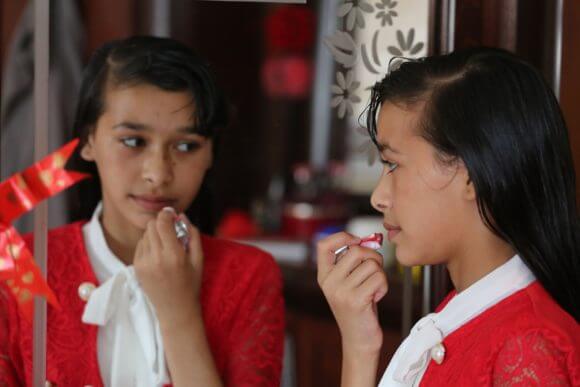
“This way I would be more beautiful and forget the pain of hundreds of nightmares that my face would not be as soft as it was before the war,” she said.
Dalia was not aware that her face became one of the famous portraits in that war. She was surprised that her image was printed on the cover of Gaza Unsilenced, an anthology co-edited by Refaat Alareer and Laila El-Haddad. “Did they really write about me in these pages, uncle?” she asked.
Dalia became a symbol of that war because in the course of fifty-one dark days, nearly 2,200 Palestinians were killed, about a quarter of them children, many of whom were deliberately targeted. One hundred and forty-two families lost three or more members. About 11,000 Gaza Palestinians were injured, maimed, or permanently disfigured.

During my visit to her family’s multi-story house in the Zaytoun district, east of Gaza city, everything seemed quiet– except for the roars of electric generators and the buzzing of Israeli drones, which rarely leave the coastal enclave’s sky.
I wondered if Dalia still imagines the war’s details during her everyday life.
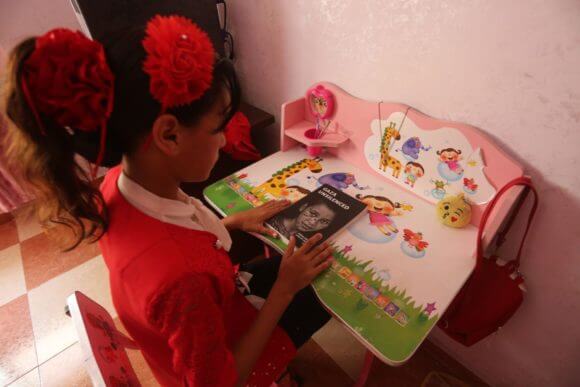
“Even the sounds of these buzzers [drones] makes me grope my cheeks or even take them between my hands,” Dalia said. Just as a tank shell missed its supposed target when it hit her house that day four years ago, she said, “The rocket from this buzzer can do so– who knows?”
Aisha, 39, Dalia’s mother, recalled when her daughter was in Shifa Hospital.
“The blood covered every inch of Dalia’s body. She was unable to open her eyes, and in those difficult moments her younger sister Remas [then 8] clung to Dalia and screamed ‘I love you’. Dalia was unaware of her surroundings, until she gradually began to recover.”
Dalia is a very quiet girl who says she wants to grow up “to be a bride and then later to be a makeup artist” in her own salon. “At least after these three wounds disappear,” she said.
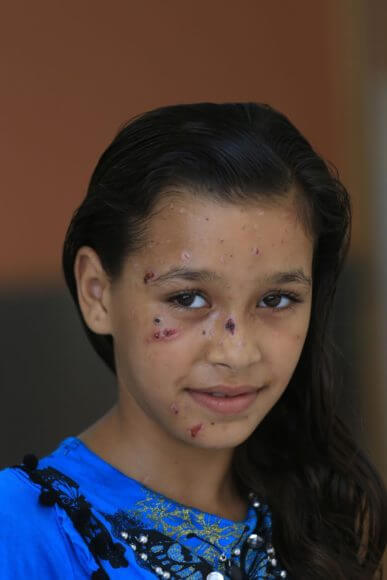
Aisha seeks to save money to pay for laser surgery to remove the remaining scars.
“I am not sure if her father and I are able to cover the cost of the surgery,” she said. Rebuilding the house drained a lot of money. “And we are seeking to wed our two sons.”
Yet Dali’s mother is encouraged about prospects for her daughter’s “100 percent recovery.” She sent Dalia to a beauty salon hours before her uncle’s wedding on June 30.
“I had to do so, so that she can feel not less beautiful than the other girls at that party. Today I hope she can overcome bed-wetting that has plagued her since she was injured,” Aisha said. “Dalia is interested in all their home’s decor details, even though it has little furniture. She hates the chaos and always volunteers to help me. She is my kingdom.. she is my queen.”
Before I left the Khalifas’ house, Dalia asked me if this interview would be published in Hebrew. I replied: “No, it will be in English.”
But why do you ask that question?
“I thought the Israeli soldiers might read it and feel shame for these facial wounds,” Dalia said. “But I do not think they are good in reading English, they are only good at shooting.”
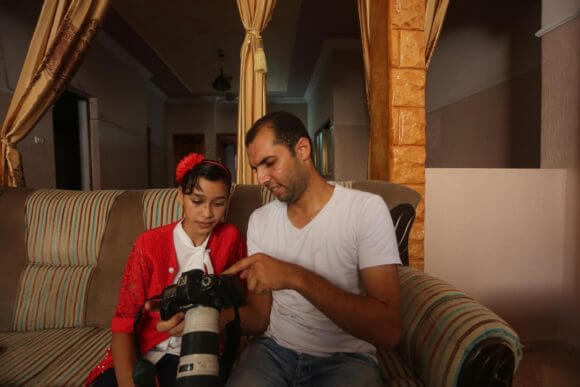
As for the famous photograph, Mohammed Asad, a photojournalist, happened to be in Shifa hospital documenting civilian casualties of Israel’s military offensive when Dalia was brought in.

“When I saw her, the image of the Afghan girl Sharbat Gula came to my mind,” Asad said, in a reference to the famous photo by Steve McCurry published in the National Geographic.
Asad took a photo of Dalia on 9 August 2014, noting that despite the shrapnel wounds to her face, she did not cry. Asad says that he had to think deeply for a whole month to put a caption of Dalia’s portrait, believing that such a good picture should also have a strong title.
The name he gave to the photo was “Assiyat al-Damea,” which translates to “the one who does not cry easily”. The English name given to the photo was “unbreakable”.

The photo became the Grand Jury Winner in a photography competition organised by the United Nations Office for the Coordination of Humanitarian Affairs in the Middle East and North Africa (OCHA).
Asad, who lost his home after it was flattened in the same war, was awarded a GoPro camera. He fixed it over his helmet to document further abuses against Palestinian civilians. “There are thousands of tragic stories made by Israeli soldiers and must be brought to the public.”
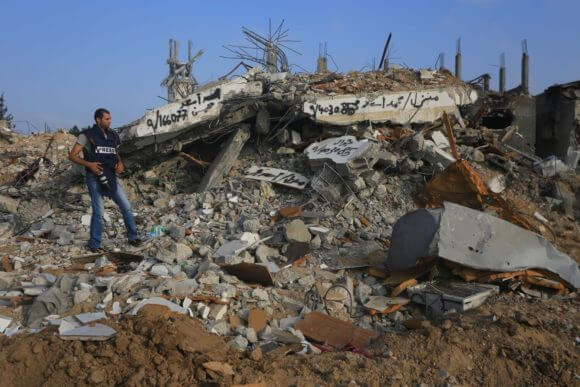
“I think the strategy of the Israeli army depends on teaching hard lessons to every Palestinian who thinks of resisting them, by intentionally causing amputations and leaving frightened, disabled people,” Asad told Mondoweiss.
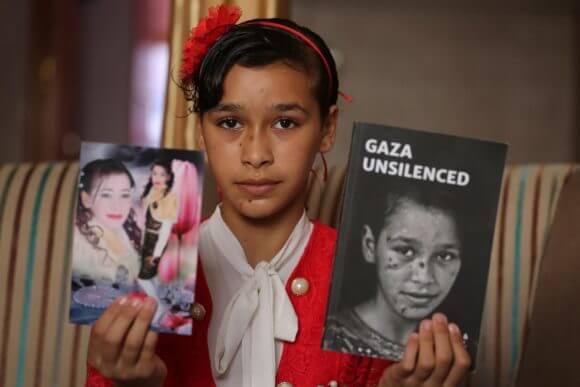
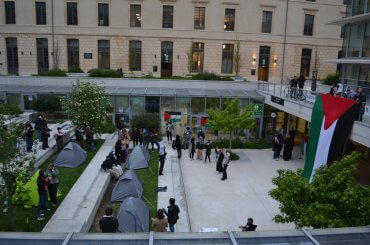

“I think the strategy of the Israeli army depends on teaching hard lessons to every Palestinian who thinks of resisting them, by intentionally causing amputations and leaving frightened, disabled people,” Asad told Mondoweiss.
Bingo!
in the devotional works ash-shifa (al shifa healing) often quote 17:74
“had We not strengthened you, you might have inclined to them”
That girl has that divine strength, wow.
“I thought the Israeli soldiers might read it and feel shame for these facial wounds,” Dalia said. “But I do not think they are good in reading English, they are only good at shooting.”
She sure knows what she’s talking about. Now that Arabic has been removed from the official languages of ‘israel’ the only official language left is smack.
I hope I live to see Dalia’s dreams realized.
“Fifty-one dark days…”
And Saint Obama didn’t lift a finger…
A note to all of you Zionist creeps out there:
When I look at the photo of Dalia Khalifa and read what happened to her at the hands of cowardly armed to the teeth Jewish Zionist occupiers, I am more determined to fight here and on other forums on behalf of her and her people. Zionism is doomed. As an accelerating purveyor of pure evil, it has no legitimacy whatsoever and ever increasing numbers of peoples around the world, including Jews, are realizing it.
“‘This way I would be more beautiful and forget the pain of hundreds of nightmares that my face would not be as soft as it was before the war,’ she said.”
Dalia, believe me, you are still truly beautiful beyond words.